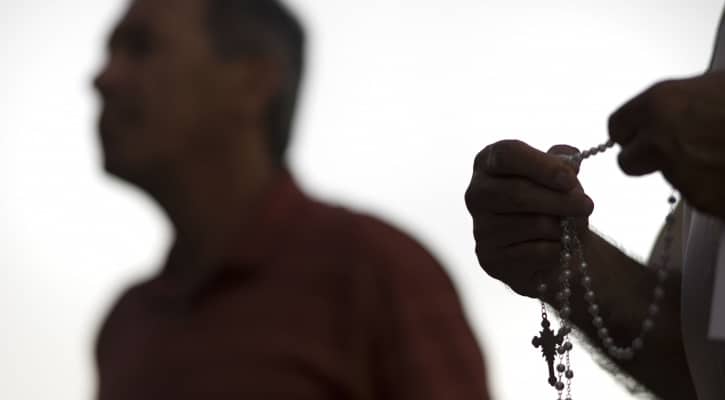The word holiness can have a discouraging effect on people. Some immediately dismiss it, perhaps a bit sadly, since they believe that whatever it is, holiness is way beyond their reach. They think of their failures and sins, and figure that if they could only get rid of them, then they could start thinking about holiness. Others become frustrated since they have sincerely tried most of their lives to be holy and, in the end, see themselves as advancing nowhere near holiness. Finally, others link holiness with saints’ lives and think: Well, there is no contest. After all, that’s why they are saints and we’re not.
Given all those difficulties, it’s no wonder that many believe that their busy but humdrum lives weigh them down like cinderblocks tied to their ankles. Though it is understandable to think that way, it draws a totally false conclusion because the initial premise is wrong. First of all, people mistakenly link holiness with perfection. It’s like they say, “Well, I’m not holy enough to be holy.” There are no perfect people, and there are no perfect saints. Saints would be the first ones to proclaim their failings and sins.
Holiness and the Will of God
But once you understand what holiness truly is, then the how about holiness is simple.
Ready for the answer? Holiness is union with God. And how do we become holy? Simply by seeking God’s will in our lives! Now I can hear the complaints: “It’s too complicated for me. I’m not a theologian”; “I’ve got three children under 12 and I’m short on patience”; “I have two teenagers”; “My husband left me”; “I’m out of work”; “I struggle with sex and sexuality”; “I’m not sure I trust God’s will because it’s going to make my life even harder”; “I’m an alcoholic.” But the above objections are not really blocks to seeking God’s will. Finding God’s will? It is right before our eyes.
How? Simple. Ask yourself right now what God wants you to do this moment. Well, right now you are reading this column. Nothing wrong with that, is there? You are in God’s will. What will you do afterwards? And for this we find that God’s will is right before my eyes if I ask, “What does my life right now call me to do?” Whether you are a working mom, a housewife, a single person working at a job, a divorced man or woman, a husband at his job or looking for work, myself as a priest and friar, we are all called to do something.
And I know that 99% of the time. I don’t have to go to the Bible to find out nor do I need to have a theology degree. I simply have to ask myself, “What am I called to do?” Of course, our obligations come first; no surprise about that. But God is not calling us to great self-denial and penances. He’s just reminding us what we do most of the time naturally. It’s about anything we do that is not sinful. Going to the beauty shop, playing golf on a weekend (men, maybe check with your wives first), relaxing on the front porch, cooking a meal, driving to work, or whatever you are doing. In fact, anything that is not a sin—and we are pretty smart in knowing what is and is not a sin—is perfectly all right.
Holiness Is Open to Everyone
Now this sounds so ordinary and so simple that it’s almost absurd. We exclaim, “Well, anyone could do that!” That’s exactly my point. In fact, that is basically the road the saints followed. But you will not be called to go to New Guinea to preach the gospel; you will likely never be called to lay down your life for your faith. You are called to do the ordinary things of your everyday life in meeting your duties and obligations and enjoying those things that you know are not wrong or sinful.
Does it mean you do so perfectly? Of course not. For all of the holiness of the saints, not a single one was perfect. If we commit a sin—and who doesn’t?—that doesn’t mean we are no longer holy or that we are no longer in union with God. We tell God we are sorry and move on.
Do you know what this means? No matter who you are and what your circumstances are, your road to holiness can be termed simply: “OK, Lord, I want to do your will for me and, now that I think about it, I almost always know what that is.” And we do.
Granted, on occasion, you have a choice to make and you need help. There are those you can talk to for guidance. But here’s something to think about: Walking the most ordinary or extraordinary journey is the way to holiness.


